Empowering a brighter future











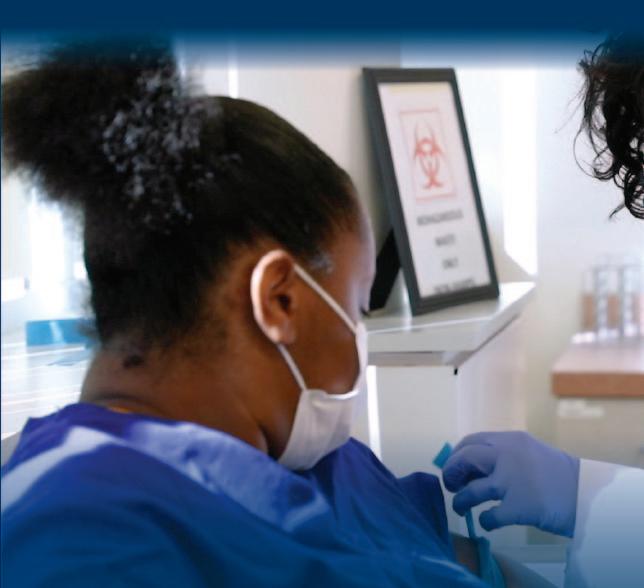
Now is an exceptional time to become a nurse in New York. First, the COVID-19 pandemic spotlighted the crucial role nurses play, resulting in increased respect and recognition for the profession. If you want to become a nurse, then St. Paul’s School of Nursing in Queens is a great choice for your education.
Also, as New York’s population ages, the demand for skilled nurses and healthcare services will continue to grow. New York area hospitals are among the best providing new nurses with unparalleled learning experiences. With its commitment to healthcare innovation, New York’s nurses are often among the first to implement new treatments and techniques.
New York’s diverse patient population allows nurses to gain unique cross-cultural competencies and to serve minority communities. If this sounds exciting to you then discover how St. Paul’s School of Nursing in Queens and Staten Island can train you to enter this rewarding career field.
St. Paul’s School of Nursing is a nonreligious institution of higher education offering two programs: (1) Associate Degree in Nursing program and (2)



Associate Degree program in Medical Assisting.



Conveniently located in Queens, we are right off the Whitestone Expressway on Queens Boulevard. Take your life and your career to the next level. Make plans now to visit our campus in historic Queens, New York, and see for yourself what you’ve been missing.
Visit www.StPaulsSchoolofNursing. edu or call the campus directly at during regular business hours at (718) 357-0500 to schedule an appointment to meet with one of our admissions advisors.
Everyone knows a student who sees college application deadlines approaching and immediately joins every club that he or she can fit into a day. Rather than suddenly spreading yourself too thin, send stronger applications and increase your overall acceptance rate by making your applications more personal, more unique and more specific to each school you are applying to. In order to catch the eye of the admissions office, you need be creative. Here’s how:
Make your essays vivih

Judith Hodara was the associate director of admissions for the University of Pennsylvania and the director of admissions for the Wharton School of Business, who now coaches high school students and MBA hopefuls through the application process.
She says, “Students should really capture a moment in their lives; a chess tournament when they have their hand on a pawn and are going to move it, getting out the door when the volunteer fire department alarm goes off, or the shock of cold water when they hit the pool for swim practice. All very small instances, but they give the reader a real idea of who the student is.”
Manage your online presence

It’s important to delete inappropriate photos or tweets, but you should also use your online presence to boost the strength of your applications. Jessica Givens, author of “Get Your Summer Strategy On,” encourages students to build a website as a showcase for their talents.
“Every college admissions official today sits only a few feet from a computer… A website is a powerful record of time spent and interests explored. Applicants want to make sure they put the web address on their applications, both in the activities section and on their personal resumés.”

Buddy up with your regional admissions rep
“Usually admissions will have representatives who cover certain areas of a state,” says Amy Macy, a former admissions counselor at the University of Colorado.
“Introduce yourself and keep in touch with that person. I had one student who was on the cusp of being accepted to CU-Boulder, but her grades weren’t quite high enough to immediately accept her. She sent me a handwritten card every month updating me on what she was up to, what skills she’d recently acquired, and how she still felt CU-Boulder was her first choice. When we were at the point where we could accept the next batch of applicants, I immediately pulled her file and accepted her.”
Check in regularly with admissions — it works in your favor
“Many colleges track how many times a student makes contact with the college, whether it’s stopping by at college fairs, visiting campus or calling the admissions office,” says Macy. “You don’t want nagging, but we’re impressed when students make themselves a presence in the admissions office.”
Show that you’ve done your research
“Students should know the school’s mission statement and values, goals for the students, university, the community and names of the department chairs and faculty,” says Elizabeth

Venturini, a college admissions coach. You should also make relationships on campus before you apply. Then, you can engage in a bit of healthy namedropping in your application and essays. Says Hodara, “I encourage students to mention faculty they may want to do research with [and reach out to that faculty member in advance so that they can really use great information].”
If you can’t visit, reach out to student leaders “[Students] should find specific clubs or organizations that they are excited about and reach out to the student leaders. They should try to imagine themselves on that campus going through a usual Wednesday,” says Hodara. If you can’t make a trip to campus, she recommends doing some research and reaching out to “have that interest come through with details and great color.”
Include supplemental materials that demonstrate your hobbies and passions
“My clients have submitted examples of their websites, musical performances and writings,” says Venturini. You can even take a multimedia approach to your supplemental materials and submit video files, music clips or photography portfolios. Says Mandee Adler, a college admissions coach, “I almost always recommend it when a student has a particular talent or interest that needs more ‘room’ or an additional medium to explain.”
And before you send any supplemental materials, make sure the college accepts them.
“At CU-Boulder, it was policy that we didn’t see or consider supplemental materials,” says Macy.
“We had a student ship extra information for their application glued to large flat rocks,” says Sandra Starke, vice provost for enrollment at Binghamton University. “It cost the student a great deal of money to ship them and it was inconvenient for us since the rocks could not be scanned or easily handled. We treated this application no differently than any other once we got rid of the rocks.”
Adler is quick to clarify an extremely important factor in sending in an exceptional college application:“My students don’t do things to have unique applications...they do things to make themselves unique that then come across in the application.”
Above photo:Finding ways to differentiate your application can lead to positive admissions decisions.
What’s the “right” number of colleges to apply to?
Decades ago, college applicants mostly applied to somewhere between one and three institutions. That wasn’t wrong, or bad, or weird — it made sense for the time! But those decades had some “interesting” traditions that have aged badly (see: Jell-O salad), and college application strategy is one of them. So, the question of how many and what sorts of colleges to apply to is something you’ll have to carefully consider within the context of your own story and today’s admission realities.
First, some baseline advice: a typical e student completes between six and 12 college applications, and that’s probably the right range for most people. Gauging your fit at each college should always be your first step. Once you’ve done that, your particular number should depend on two things: the selectivity of the colleges on your list, and how much effort you will be able to put into your applications while still achieving academic excellence in your senior year.
Now, let’s get specific.
Selectivity
A smart college list accomplishes many goals while still being well-balanced. A list should be made up of colleges that a) students will love; b) that they can afford; and c) that they might be admitted to. If the colleges on your list accomplish all those goals, you’re probably on the right track.

The next step is to make sure your list is balanced — or, in admissions-speak, that you have at least a couple of colleges that you will almost certainly be admitted to. The general strategy here is to divide your list between these likely colleges that should form the foundation of your list; a few target colleges where your academic record matches the typical admitted student; and only a small number of reach colleges that are very selective or where your academic record is somewhat (but not strikingly) lower than the typical admitted student.
Students, as you research your colleges, don’t give a school “extra points” because you’ve heard of it or because of its reputation. Instead, do a deep dive. Learn, specifically, what programs you’d take advantage of; which research you’d engage with; which professor you’d learn from. You’ll find some gems among the less-famous colleges you research.
And keep in mind that many of the reasons highly selective colleges are popular are pure myths. Study after study has shown that for most students, attending a selective college gives no measurable benefit to career outcomes. It does not result in increased happiness or feelings of worth. And if it’s not a fit for your specific priorities, it may not be a good choice for you. So, make sure those “reach” colleges don’t take over your list.
The Workload College applications are a lot of work — there’s a reason nearly 25,000 students have worked with Collegewise to guide them through their admission journey. So, as you’re building your own list, keep in mind the
commitment — in time, cost, and mental space — you’re making by applying to these institutions. Here’s what to consider:
Essays: A good essay takes time. Let’s imagine you’re applying to fifteen colleges that each have three essays. Assuming 300 words apiece (a common length), you’re writing 45 essays and likely around 13,000 words. That’s…a lot.
Testing: Do these colleges require you to take admission tests like the ACT or SAT? Those tests-required institutions are still a minority, but you should pay close attention to the requirements at each of the campuses you’re applying to If they require a test score or if your score might be helpful in your application (talk to your school counselor if you need some advice), you’ll need to devote time and money to preparing for and taking the exam.
Demonstrated interest: If you’re struggling to find the time to ask questions of admission counselors, show up to college fairs, or visit the colleges on your list (either virtually or in person), that’s a good sign you’re applying to too many colleges. And that’s not just a bad sign for you — it’s bad for your applications, too. Many colleges track applicants’ demonstrated interest, or the amount of engagement they’ve had with the college during the application process. Students who have done the research and connected with the colleges they’re applying to often have an advantage over those who apply sight-unseen.
Considering the workload associated with each application makes “the shotgun approach” less compelling as a strategy, which is a good thing. Often, students (or their parents) engage in some basic math that goes something like this: “Ten highly selective institutions — the Ivy League colleges plus Stanford and Duke — had an average admit rate of about 8%. That means if I apply to all 10, I have an 80% shot at admission to one of them.”
You know better than that. And don’t fill up your list with applications to the most selective colleges in the world.
There is no “right” number of applications. So you’ll need to consider carefully the selectivity of the colleges you’re applying to and the amount of work you have to put into each. But more importantly, make sure you’re applying to colleges that will give you the support you need to accomplish your educational goals.
Pay less attention to the name on the diploma and more attention to the mentorship, research, or service opportunities that will impact what you actually do at college. If you engage thoughtfully with your college research and choose the schools whose mission matches yours, you’ll find that the question of how many and what sorts of colleges to apply to will often answer itself.
Courtesy CollegewiseMany college and scholarship applications require recommendation letters. Some specify the recommenders-teachers, employers, or personal acquaintances; others simply indicate the number of recommendations required. Selection committees want to know as much as possible about you. They have objective informationgrades, classes, and test scores. They have your application form, résumé, and essay(s). They also want to know how others see you.
The big ask
Select recommenders who know you well and who can write competently. Well-meaning friends may write glowing comments, but poor grammar and unprofessional appearances make negative impressions. Choose recommenders who will write specific statements about you-not remarks that could apply to any student. Generic comments reflect little about you and do not help you stand out among the applicants.
Solicit college recommendation letters politely and appreciatively. Allow your recommender plenty of time; requesting a recommendation at the last minute is inconsiderate. People who write the best recommendations are usually very busy. You don’t want one written by someone who feels hurried or is irritated with you.
Provide relevant information so the letter of recommendation will be specifically about you and your qualifications. Indicate the purpose of the recommendation letter. If it is to accompany your college application, provide the college’s name and background information so the recommender can discuss how you are an appropriate candidate. If it is for a scholarship, provide a copy of the application or a description of the scholarship and the sponsoring organization’s mission. Supply a copy of your résumé listing your GPA, activities, leadership roles, awards, community service, employment experience, and special skills.
Indicate the person to whom a recommendation letter should be addressed. If you don’t know the name, the letter may begin “Dear Selection Committee.” Offer an addressed, stamped envelope with each request. If the recommendation must be mailed in an official envelope from the recommender’s institution, supply a postage stamp. A letter that is to be submitted with the application should be returned to you in a sealed envelope.
Many applications allow you to waive the right to see recommendations. Despite your legal right to see referrals, committees are impressed by those written with no concerns about the applicant’s reaction. Select your recommender(s) carefully, and you’ll have no reason to worry; most will say if they aren’t comfortable writing a college recommendation letter or don’t believe they can write positive statements about you.
Have your recommenders save their letters if you’re applying to several colleges or for several scholarships. Although each college recommendation letter should be tailored to the application at hand, the original passage contains basically what the recommender wants to share about you. Revising an original recommendation is more convenient than writing a new one.
Thank your recommender-preferably in writing! Surprisingly, few students express their appreciation for recommendations. Expressing your gratitude is appropriate and advisable. If you weren’t appreciative the first time, the recommender may be reluctant to help you when you ask for another college recommendation letter. If you receive the acceptance or the award, thank the recommender again, for contributing to your success.
Just like with any other college application element, it’s important to start planning early and get a head start to make the process of gathering recommendation letters quick and easy.
Above Approaching a counselor or teacher and asking them to write a recommendation can be an intimidating task, and many students will put it off – making the process even more difficult for both the student and the recommender.
An essential part of the application process
Nassau Community College of the State University of New York transforms lives. With over 80 associate degrees and certificates taught by distinguished faculty, Nassau provides a studentfocused academic environment with small class sizes, flexible course schedules and affordable tuition. The college is holding tuition and fees at its current rate for the fourth consecutive year.
The College Experience
Located in Garden City, the campus is the ideal environment for the complete college experience. With over 85 student clubs, 26 intercollegiate sports teams, study abroad opportunities, and a dedicated career counseling program, Nassau Community College is the college of choice for nearly 14,000 fulland part-time students.
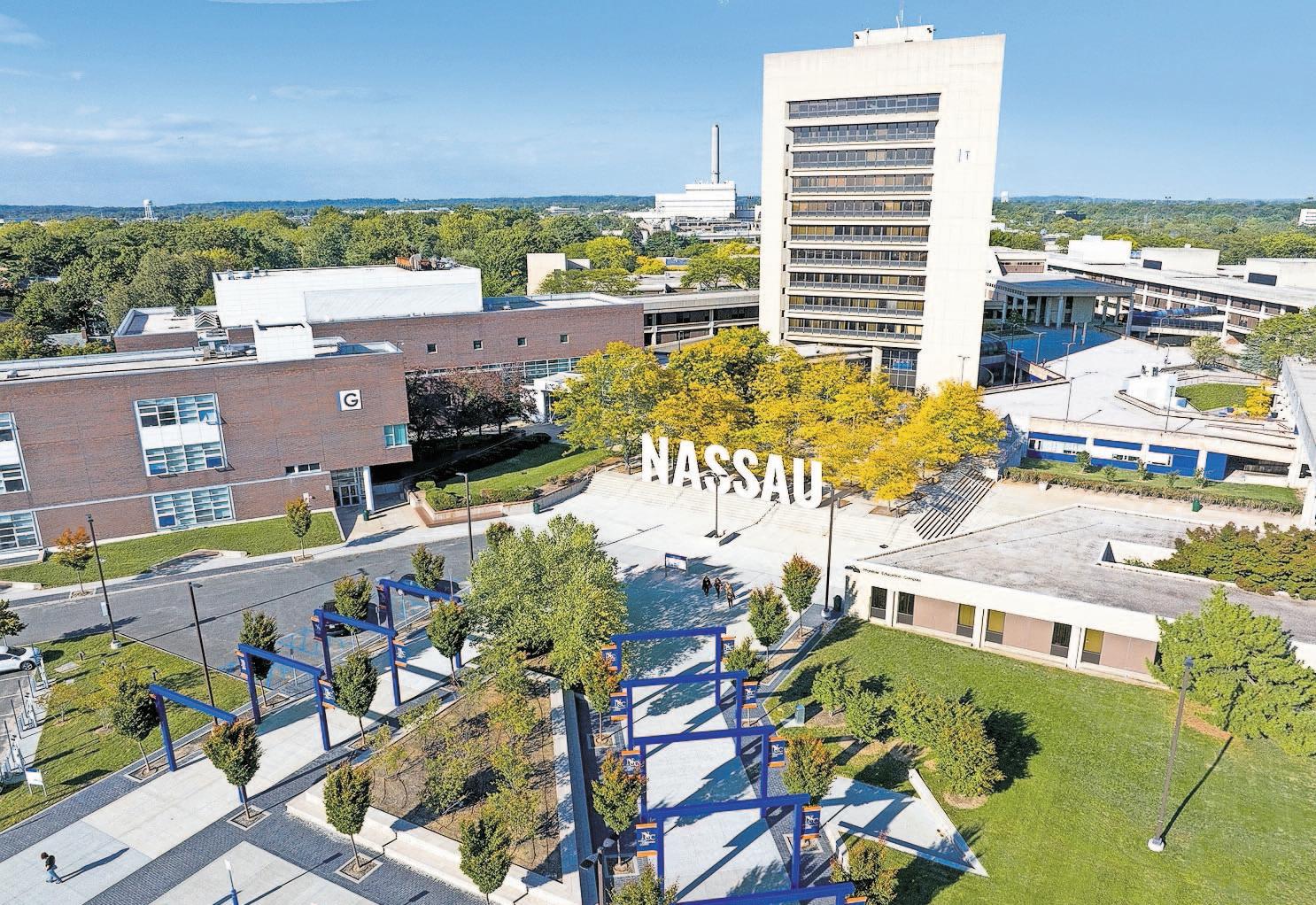
• New Academic Programs: NCC continues to meet the demands of the labor force through innovative programs in Chemical Technology, Cybersecurity, English, Health Care Administration, Medical Assistant, and an online certificate in Paralegal Studies.
• Learning Spaces: The campus is opening a 61,900 square foot high-tech academic center to prepare students for STEM careers to meet the demands of the virtual and hybrid workforce. Additionally, the campus boasts a number of state-of-the-art labs, a public radio station, and unique theater facilities and natural light art studios.
• Nassau - Adelphi Gateway Program: Students have the opportunity to earn an Associate’s degree while residing at Adelphi University and being a part of campus life.
• Honors Program: Academically motivated learners participate in externships, networking and scholarship opportunities while receiving superb preparation for transferring to a fouryear university.
• Nationally Ranked Athletics: NCC coaches are focused on studentathletes achieving success both inside and outside the classroom. The college is home to championship lacrosse, football, wrestling and cheerleading teams.
• Individualized Support Services: The Student Services Center provides career and education counseling to prepare students for university transfer or immediate employment.

• Scholarships: The college offers countless scholarship opportunities for

continued academic success at NCC and beyond. Nearly 49% of students attend Nassau tuition free after aid.
• Workforce Development Programs: The college partners with top companies such as Google and Northwell Health to provide careerready education that trains students for jobs that are in high demand throughout the New York metro area.

The NCC alumni network is over 162,000 strong with graduates finding success as elected officials, doctors, attorneys, teachers, professional athletes, executives, financial advisors, hedge fund managers, artists, actors, fashion designers, sports managers, and IT professionals — and the list goes on.
Join the ever-growing ranks of NCC graduates and start your journey to a successful future today! Apply now at ncc.edu/apply.
As a first-generation college student, I knew that attending Nassau was my best option for a great education at an affordable cost to avoid taking on student loan debt. Smaller class sizes allowed me to have more one-on-one time with my professors. I had access to wonderful campus resources like mentoring and a network of people guiding me on my path to success.
– Tasnia Zzoha, Finance/Business major, NCC Student Government Association President.



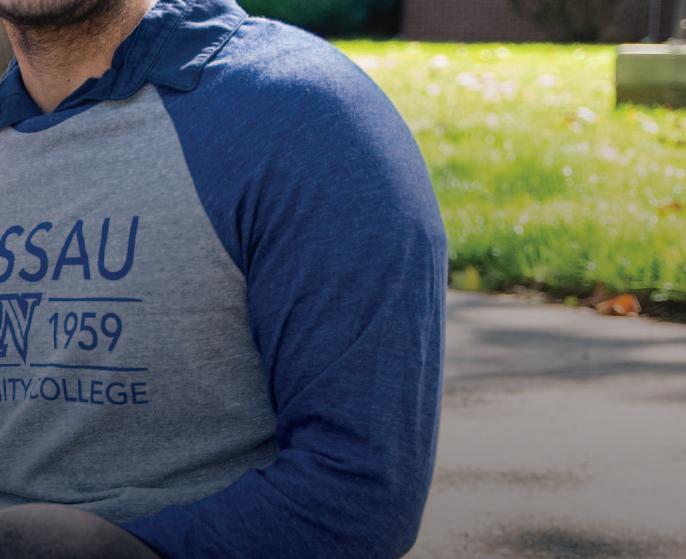


“Molloy University where you are much more than a number.
Molloy, where you’ll find a learning style that fits your lifestyle.
“If you come to Molloy, you graduate with a job in your field at a salary that’s significantly higher than average.”
- Dr. James Lentini President, Molloy College

Students and their families are always looking for an academic environment that offers the best fit and the best value for their tuition dollars. Molloy was recently recognized as one of Money Magazine’s 2023 “Best Colleges” receiving a coveted 4-star rating. The Princeton Review also named Molloy one of the “Best Regional
Colleges” for 2023, and the University was ranked #15 on a list of the “Safest Colleges” in the nation, as chosen by Niche

In addition to being recognized as a great value, Molloy is one of the lower-priced private universities in the region, and approximately 90% of Molloy students receive some form of institutional aid. Additionally, Molloy’s strong retention and graduation rates mean that most of our students graduate on time, resulting in significant financial savings compared to students who transfer to other colleges or universities.
A small student-to-faculty ratio (10:1) means that you are more than a number to our professors, who provide input and guidance that will enable you to pursue your dreams.

At Molloy, you can earn your degree in a variety of outstanding academic programs
(including nursing, business, education, social work, music therapy, computer studies and many more) that lead to rich and rewarding careers. Additionally, Molloy offers a variety of graduate and doctoral programs that provide the opportunity for you to further enhance your career or take a new direction while pursuing a passion. The College’s graduate programs include a variety of MBA options, as well as programs in clinical mental health counseling, criminal justice, music therapy, speech-language pathology, education and nursing. There are many flexible learning options available.
Not all learning takes place in the classroom. With more than 50 clubs/ student associations, evening and weekend activities and trips, a 550-seat theatre, exciting dining options, and popular study and meeting areas, Molloy gives you the opportunity to enjoy yourself and make new friends. Whatever your interest, Molloy has
something for you!
Are you interested in living on campus?
Molloy’s three residence halls house approximately 350 students and provide energy for a campus already buzzing with activity. Living with roommates, meeting new people, and learning to live on your own will help you succeed in and out of the classroom.
Don’t take our word for it. Visit our campus and see for yourself all the wonderful opportunities Molloy has to offer.
At Molloy University, you’ll think about your future in a whole new way.
Welcome to the new U!



High school students have busy schedules often filled with extracurricular activities, clubs, volunteer work not to mention academic work, too! All of these aspects make up who you are as a student and that’s exactly what you want colleges to see. Building a brag sheet can help you give colleges the necessary information they should know about you, whether it’s through your voice or a teacher’s.
How and why to build a ‘brag sheet’
What’s a brag sheet? A brag sheet is very similar to a student resume it highlights your accomplishments, key experiences, leadership skills and employment throughout your high school career. Essentially, it’s a quick reference guide with all of the details and achievements for someone trying to get to know you better.
Your brag sheet can be used for a variety of different purposes. You can share your brag sheet with your teachers, coaches or with any other adults with whom you are asking for letters of recommendation. Though a teacher may have you in their class, they may not necessarily know all of the clubs and activities you participate in, both in and out of school. The brag sheet will help them easily reference your accomplishments, activities and skills, should they need help remember, many of these adults have hundreds of students to keep track of so it’s difficult to reference each student’s accomplishments without help.
Making it easier for them to do so will help
them write a letter of recommendation effortlessly and this certainly works in your favor. Including your brag sheet with your college applications can also give college admissions officers more insight into who you are, not only as a student, but as a human being as well. While it’s wonderful to have a great GPA and high test scores, colleges also want to see students who have passion, students who give back to the community and who are active beyond traditional academics.
How can a brag sheet help me?
The brag sheet offers you a chance to shine beyond academics especially if your GPA or test scores aren’t quite as high as you’d like. Take the opportunity to show off your individuality

and highlight your personal attributes, which more than make up for a score, because that’s what makes you unique.

Formatting a brag sheet
As with college essays, keep your brag sheet as clear and concise as possible. Anyone who will be reading your brag sheet will be reading many student documents, so under a page is always best. Use bullet points instead of long paragraphs for readability, making sure that whoever reads your sheet can easily scan and still get the main points.
Keep in mind that your brag sheet won’t look exactly like a typical resume. For example, a business professional will certainly have a different look and feel to his or her resume than your
brag sheet, just as your resume would look different if you were applying for a job versus creating a brag sheet for college applications.
Yes, you should include your GPA and any test scores (such as the PSAT, SAT and ACT) but your brag sheet will also include many other highlights of your high school career as well. Starting from ninth grade, include all of your experiences. Ideally, you would have been keeping track of all your time in any extracurricular activity, sport, club, travel time, volunteer service, as well as any awards, leadership positions, etc.

However, if you have not been keeping track, there’s no time like the present to create your list. Also, keep in mind that this is called a brag sheet for a reason. It can seem uncomfortable listing all you’ve accomplished, but they are your accomplishments! While you should be honest (some schools do verify the truth to these), you should not be overly humble it’s time to highlight your accomplishments! At the top of your brag sheet, include your name, address and contact information.
Additionally, some brag sheets include a question and answer format, which is your option. Some students answer questions, but only include them when giving their brag sheet to individuals writing letters of recommendation and not to potential colleges.
Courtesy Fastweb
With over 50 undergraduate degree programs, Molloy University combines academic excellence and leadership with personal mentoring. Molloy’s programs in healthcare, education, business and arts and sciences will lead you to an exciting career. Here, you’ll think about your future in a whole new way.
Understanding how the landscape of college admissions continues to shift will help you manage your expectations and make smart decisions throughout the college admissions process. Here are trends to keep an eye on, according to admissions experts.
Colleges saw a significant increase in applications during the 2020-2021 and 2021-2022 admission cycles, largely because many of these schools went test-optional. The Common Application saw this trend continue in 20222023, reporting that applications submitted through its portal were up 7.5 percent from the previous year. While the nation’s most selective schools saw big increases in their application volume, so did some less competitive public colleges. The State University of New York (SUNY) system, for example, reported that applications for the Fall 2023 term increased 110 percent from the previous year.
With the increase in applications, admission rates have been on the decline, most notably at highly selective schools. Harvard’s regular admission rate dropped from 3.43 percent in 2020-21 to a new record low of 3.19 percent in 2021-22, while Boston University’s admission rate dropped during the same period from 18.3 percent to 14 percent.
Admission rates also dropped at colleges that top students once considered reliable match schools or safeties. For example, during the 2020-2021 and 2021-2022 admission cycles, Colgate University’s admission rate dropped from 27.4 percent to 12.34 percent, while Auburn University’s admission rate dropped from 85% to 24%. Admission rates for 2022-2023 have not been announced but are expected to remain just as low.
Given this competitive environment, admission experts say students shouldn’t assume they’ll be a ‘shoe-in’ at any school. “As the acceptance rates dip lower, even the most qualified candidates cannot be guaranteed an offer of admission,” says Lauren Dodington, a college admission advisor at The BestU. “Every student, no matter how high their GPA or test scores, should have a range of colleges that are possible fits, including those with acceptance rates at and above 50 percent.”
More students are applying to college with early application plans, like Early Decision and Early Action. Students who apply Early Decision or Early Action submit their applications much earlier than Regular Decision applicants and receive their decisions earlier. Students who apply to binding Early Decision plans must commit to attending the college if admitted; students applying Early Action usually don’t need to commit.
Elite colleges including Harvard, Yale, Penn, and the University of Virginia received record high numbers of early applications during the 2020-2021 and 2021-2022 admission cycles, which resulted in record low early admission rates. For the current 2022-2023 admission cycle, early acceptance rates remained low. Duke University, for example reported its lowest Early Decision admission rate ever (16.5 percent, down 21.3 percent from the previous admission cycle), and Brown University’s early acceptance rate dropped from 14.6 percent in 2021-22 to 12.98 in
2022-23.
Before the pandemic, colleges admitted no more than 20-30 percent of their freshman classes through early admission rounds, but this is changing. For its 2022-23 freshman class, Barnard college admitted 62 percent through early admission, Boston University admitted 50 percent, and Penn 51 percent.
Second Early Decision rounds have also popped up at more colleges and universities. According to Andrew Belasco, a counselor with College Transitions, more than 70 schools now offer an additional Early Decision round (ED2) featuring a later deadline than ED1 often in December or January as opposed to October or November. This gives students who are denied from their first choice Early Decision school an opportunity to commit early to a second choice, and another chance for colleges to snap up students who promise to enroll if accepted.
So how should students applying to college approach early admission now? First, adjust your expectations. “Many students think that just because they’re applying Early Decision or Early Action, their chances will be better,” says Helen Ingerson, a lead counselor with BlueStars Admissions Consulting. “A college may have more open slots in the prospective class, but these students also face stiffer competition. Students who are not competitive within that stronger applicant pool may not see a statistical “bump” in their chances.”
Next, students should be strategic about where they apply early. “For some students, it might make sense to apply Early Decision or Early Action to a slightly less ‘highly rejective’ school,” says Laura Schadler, student outcomes director and lead counselor at BlueStars. “When students are strategic and apply early at target schools in addition to reach schools, they can often maximize their chances for sizable merit aid packages.”
Students should also weigh the benefits of applying early against the drawbacks which include having less time to polish your applications or perform thorough research into each college. “If you need more time to finalize your essay or to show off great fall grades, you should feel free to take that time,” advises Ian Parker, an advisor with Collegewise. Students who commit to a school in an early application round can’t compare financial aid offers from other colleges, either, which is a drawback for students who depend on financial aid.
Students applying ED also risk getting rejected instead of being deferred to the RD pool, a practice that Dodington thinks may be on the rise at some highly selective colleges but can actually be better for a student in the long run.“A student is better served by investing their energy into creating excellent regular decision applications, not by holding false hope in a college that is not seriously considering them.”
More than 80 percent of four-year colleges in the U.S. will not require applicants to submit SAT or ACT scores for the 2023-2024 admission cycles. Two-thirds plan to extend their test-optional or test-blind policies through 2024-2025, and 90 colleges made their test-optional/test blind policies permanent. However, some colleges have maintained or reinstated their testing require-
ments, including the Massachusetts Institute of Technology, the University of Florida, Auburn University, Georgetown University, and the University of Tennessee system. Of the students applying 2022-23 through the Common App, 47 percent submitted test scores with their applications, compared to 78 percent between 2019 and 2022.
With the boom in test-optional schools, college admission advisors are advising their students to submit test scores if they fall at or above the 50th percentile of the college’s previous freshman class. As a result, the majority of applicants submitting scores over the past two admission cycles have been students with scores well above average. This has increased some colleges’ average score ranges significantly. Students now worry that a SAT or ACT score that was “good” a few years ago may now be considered “below” average.
Students applying to college during the 2023-2024 admission cycle may benefit from focusing on their SAT and ACT subscores. “The total score isn’t always as important as subscores that align with the students’ major or interests,” explains Ingerson. “STEM majors must have very strong math scores and grades; history/humanities majors should have strong verbal scores; every college cares about the reading score, despite the major, because that’s the one that tells them whether a student can think.”
Dodington has noticed a small but growing number of students are choosing to forgo the tests entirely and apply only to test-optional or test-free colleges. “In these cases, students focus on earning their best grades in high school, writing strong essays, and engaging deeply in their activities, opting not to prepare for or take the ACT or SAT exams at all.”
Several colleges now offer students the opportunity to submit a video essay or introduction some even before you apply. Brown, Tufts, Washington University in St. Louis. Goucher, Bowdoin, George Mason University and the University of Chicago are some of the colleges that let students submit a video with their application.
“I’ve definitely seen more colleges offer video introductions as an optional part of the application process,” says Parker. “It’s a way for colleges to get to know the students applying in a less formal way than is possible in a written application.” Schadler agrees. “We strongly encourage our students to take advantage of the video introductions. This is a fun and important opportunity to share more of your personality and a story or two that is not anywhere else in the application.”
The key, says admission experts, is to be authentic, spontaneous, and not worry too much about production values.
College admissions continues to be challenging for students applying to popular and
competitive majors. Students should prepare for deeper scrutiny of their applications and their fit with the specific major program. “For popular majors like computer science and biology, you can’t just say you are interested in “all computer science” or “all biology,” says Ingerson. “Students should describe why a college has exactly the combination of programs in the specific subset of the field they are interested in not just the major,” she says.
Students’ past experiences in high school should also line up with their desired major. According to Schadler, “You’ll want to demonstrate meaningful experience in your or field and be able to write about the ‘future you’: consider how you will be engaged in the study of this subject and what particular aspirations you have in mind for college and beyond.”
Students also might want to think twice about listing a less-popular major on their application, with the hope of transferring schools or departments later. “I hear about this strategy a lot, and it works out less often than students think,” says Parker. “If you wouldn’t be admitted to a major as a first-year applicant, it’s extremely unlikely you’d be admitted as a transfer.”
Dodington agrees: “Pathways to change majors within a specific college can be difficult, and admissions readers tend to see right through an interest that is not well supported by the rest of the application.”
It may make sense to consider a different but related major, advises Schadler, or propose a minor in the more competitive academic interest, as long as it aligns with what you’ve been doing in high school. “There is definitely a sound strategy around considering a cluster of related majors and thinking about which one might be less competitive at certain schools. But students will want to consider how easy it is to move around once in the school. Are their majors in different ‘schools’ within the university, for example?”
Understanding ‘Fit’
Focusing on your personal college fit is more important than ever. Most of these trends apply to the most selective, popular, and prestigious schools, which have always been difficult to get into. As college advisors will tell you, many colleges not just highly selective ones can provide you with outstanding educational opportunities and lead to success after graduation.

One way to combat the uncertainty of a competitive admissions landscape is to stay focused on the factors that matter to you. Parker at Collegewise sums it up well: “Make sure that you’re choosing a college because it fits you, not because it matches an idea of success that others are defining for you.”
Above photo: If you take the time to do your research and keep yourself open to a wide range of colleges and universities, you’re bound to find many college options that will be right for you academically, socially, and financially.
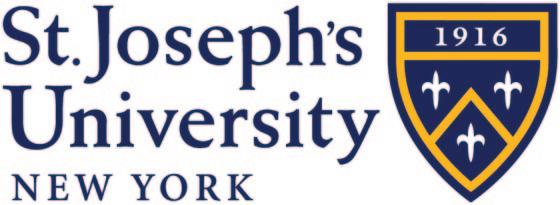
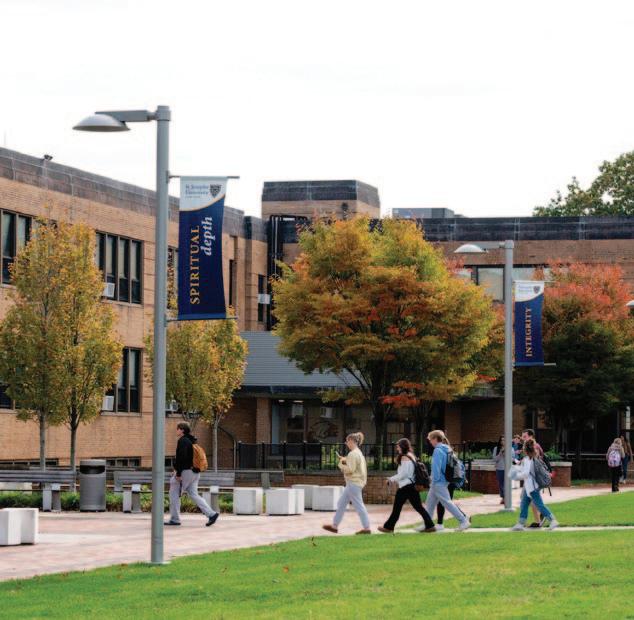
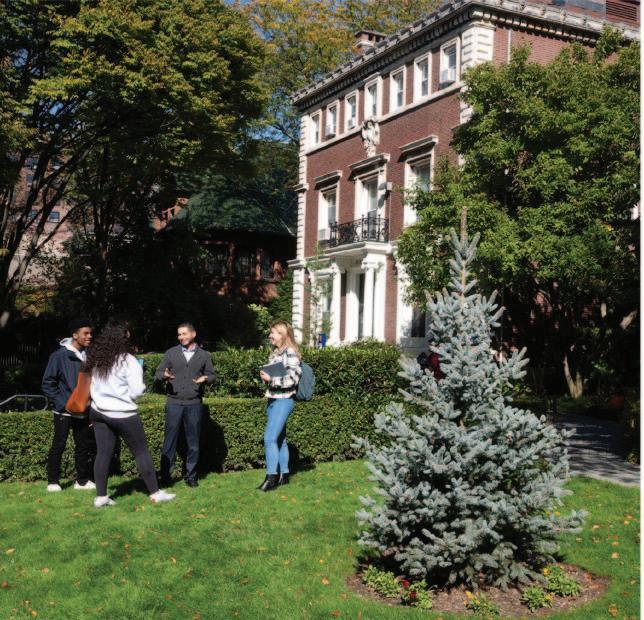

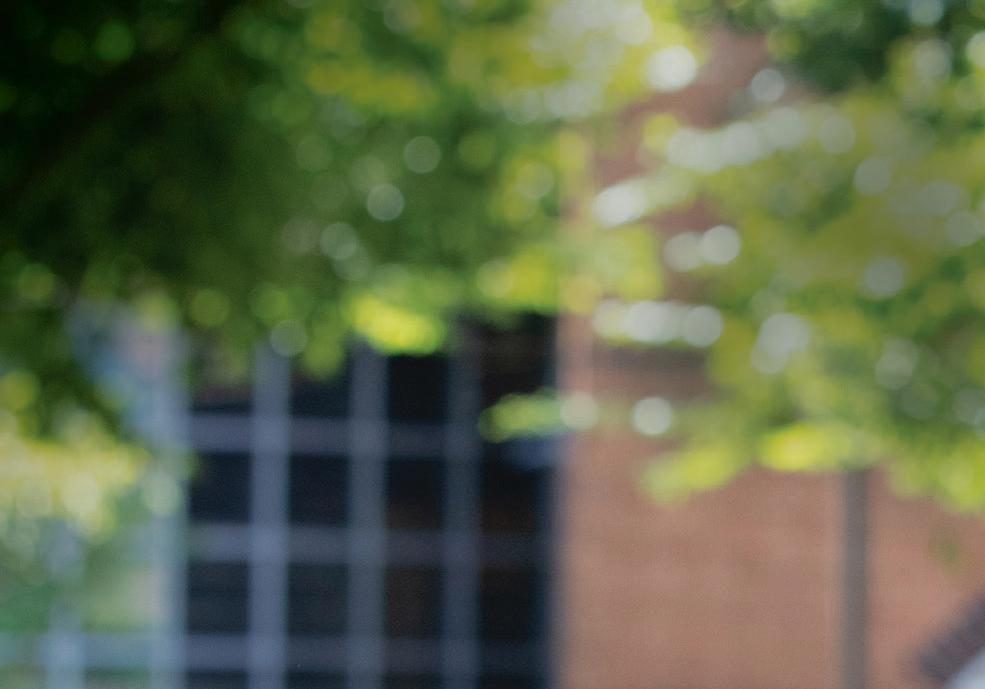




Adegree from St. Joseph’s University, New York is an invaluable tool as you navigate forward and prepare for a rewarding and meaningful career. Formerly St. Joseph’s College, our university designation is a clear signal that we’re an institution on the move, ready to meet the challenges of an evolving educational landscape, setting you up for success in today’s world.
St. Joseph’s prepares you to take the next step toward your goals with an affordable education and an array of award-winning programs, highly ranked by U.S. News & World Report. With degrees in more than 100 majors, special course offerings and certificates, affiliated and pre-professional programs, St. Joseph’s offers something for everyone.




St. Joseph’s University, New York is continually recognized as a military-friendly school. We have been ranked by U.S. News & World Report and Military Times for our commitment to providing opportunities to America’s veterans and active military. As a proud participant in the Post-9/11 GI Bill® Yellow Ribbon Program, we offer special tuition rates for service members and their families, as well as veteran-centric resources for a positive job search experience and career outcomes.
When you enroll at St. Joseph’s University, New York you’re doing more than nourishing your intellectual passions, you’re investing in your future. Students get a solid academic and values-oriented education from a faculty of industry leaders who serve as valued mentors. Throughout your studies, you’ll network with professionals, gain valuable experience and learn more about the subjects you love.

As we all know, the pandemic brought many changes to higher education, including the admissions process. Many students were not able to take the long-required SAT and ACT tests due to health concerns. Testing sites had to change all their practices to accommodate pandemic restrictions, resulting in the closing of test sites and cancellation of many tests. Colleges were under pressure to adopt their test-optional policies given that many students could not take a test.
Many colleges and universities have long understood the biases of these tests and many were already revamping their testing requirements. Admissions officers already knew there were many predictors as to whether a student would be successful at their school, and that tests were not the most valuable criteria for judgment. Many institutions have been test optional for many years, while others were in the midst of making changes in their policies and with their staff training. Because of Covid-19, colleges were under enormous pressure to make faster changes and decisions.
As a result, colleges and universities in the U.S. significantly changed their testing requirements, in many cases permanently.
At the moment, there are four key terms to describe current testing admissions policies. Test Required means the SAT or ACT is required for admissions and/or merit schol-
arships. Some schools do not require test scores for admissions, but still require them for merit aid consideration. There are also certain groups of students who may be required to submit scores such as international students, homeschooled students, students in particular majors, or students in unranked school systems.
Test Flexible means the college requires some type of test score, but it does not have to be the SAT or ACT. Students have the option of sending in AP scores, IB scores, or other standardized test scores for admissions purposes. In the past, NYU and Hamilton were both test-flexible schools, now they have shifted to test optional.
Test Optional means a student does not have to submit test scores as part of their application. Students who test well relative to the school’s median scores are often encouraged to take and send in scores. Students who do not test well can take the test and then decide if they want to send in the scores. If scores are not submitted, other parts of the application may bear more weight, or the student may be asked to submit additional materials, like a supplemental essay or a graded class paper. Students are not penalized for not submitting scores.
Test Blind/Free is the policy that states no test scores will be looked at, even if submitted. If a student accidentally submits a score or if it is listed on a transcript, the admissions office cannot use it as criteria for admitting or denying
a student. Hampshire College has been test free for a few years. (Note: the term test blind is seen as ableist, and so test free is preferred.)
Determining the best plan
Admissions professionals counsel that students should still test. Having one test under your belt may help if a school you are interested requires it for admissions or merit scholarship purposes. If you are not happy with your performance, then you can decide if you want to send it.
You should look at how your score compares to the national average, the college’s average and against your own grades.
Compare to national averages: The SAT national average is about 1000 and the ACT is about 20. If your scores are above, then that’s already a good sign.
Compare to averages of the colleges you want to attend: The general feeling here has been to see if your score is in the middle 50 per-
cent of scores. If so, this school might be a good target. If your score is in the top 25 percent, you can rest a bit easier. If your score is in the bottom 25 percent, you should not send in the score.
Compare to your own grades: Do you have consistent grades and scores, or is there a discrepancy between your scores and grades?
Colleges love consistency, so if your grades and test scores are good, then they feel reassured. If your grades are high and test scores seem low, then you might skip sending in the score. If you have low grades and high test scores, then that might be a red flag to them because they might wonder if you are applying yourself in the classroom. Good test scores rarely outweigh a low GPA, unless an explanation is provided by the student, counselor, or a recommender. Courtesy Collegewise.com

Above photo: Refrain from assuming that applying to a test-optional college or university will guarantee 100 percent admission.
Most institutions use a holistic approach to the admissions process these days. Instead of simply looking at test scores and grades, admissions teams want to get a clear picture of the whole applicant. For this reason, you may be asked for supplemental application materials such as goal statements, personal essays and letters of recommendation.
You likely have heard from your high school instructors that college recommendations are important. This isn’t just something they say to encourage good classroom behavior!
Speak to your character
A recommender who knows you well and you have a good rapport with should be able to write a stellar recommendation letter. Since the admissions officer wants to know more about you personally in the holistic selection process, it is helpful to have a recommender who can really speak to your personal qualities that make you a great addition to a college campus.
They can address anything from your dedication, trustworthiness, creativity, and perseverance, to your social skills and friendliness. Encourage your recommender to use specific examples that demonstrate these qualities.
Supportyour skills and interests
Many times, you will need to identify your skills, interests, and hobbies in your application, but it is certainly helpful if what you report is corroborated by someone else. If you are applying to an engineering program, your recommender can discuss your keen calculus skills. If you are applying to a social work degree, your

recommender can talk about your various volunteer activities in the community, demonstrating that you truly have a passion for your future field of study.
Considering a major in the arts? Your recommender can address your passion, creativity, and dedication to your craft.
College recommendation letters can address a wide range of interests and skills, which will help the admissions teams at your intended colleges get a better sense of who you are and, hopefully, come to the conclusion that you would be an active, involved member of their campus community.
Assess classroom behavior
Admissions offices want to know they are accepting students who will be productive and respectful in the classroom, and avoiding students who will cause chaos or discomfort for their peers and faculty. Your high school teachers can provide excellent commentary on your classroom behavior, since they have experienced it first-hand.
Further strengthen your application
You may have an excellent application already; took only honors courses, scored well on the SAT or ACT, and wrote an inspiring personal essay. However, it immensely helps your application to have a third-party, objective, and enthusiastic statement about who you are as a person and a student. A poor, or even apathetic, letter of recommendation could be the nail in your admissions coffin.
To avoid this scenario, only select recom-
menders who you know think highly of you. Be sure to talk to your recommender before he or she starts writing to ensure he or she has enough information to craft a powerful letter that describes clearly who you are and why you should be admitted to your college of choice.
Also, sometimes, even great students experience personal or academic hardship. For example, if you experienced a death in the family, undiagnosed learning disability, personal illness, or another emergency that negatively impacted your high school grades, your recommendation
letters can help justify or explain these academic prformanc gaps. Recommenders can explain the situation from a sympathetic and supportive stance, while painting the picture for an admissions officer that you are still a good fit for a program or college despite your struggles.
At Hofstra University, you will learn and grow on a campus that offers engaging classes, exceptional facilities, dedicated faculty, and a supportive network of peers and mentors. You will discover your strengths and find your purpose through career-enhancing, life-shaping experiences. Hofstra’s 165 undergraduate program options make it easy to explore your interests and tailor your college journey. Across every discipline and major, Hofstra combines the tight-knit community of a small college with the international reach, reputation, and resources of a large university.
The University’s proximity to everything that Long Island and New York City have to offer ensures that students may access internships and co-op positions with leading companies and organizations in nearly every industry. These experiences often lead to job offers; in fact, 92% of Hofstra undergraduate degree recipients report being employed or in graduate school within a year of graduation.
Classes at Hofstra are small – averaging just 21 students – and Hofstra professors are leading scholars and dedicated educators who take the time to get to know their students.
Since its founding in 1935, Hofstra has grown from one central house to 117 buildings on 244 acres. These include the Zarb School of Business’ Leo A. Guthart Hall for Innovation and Discovery, a high-tech wonder that includes a behavioral research in business lab; an enhanced business incubator; the Institute of Innovation and Entrepreneurship; and the interdisciplinary, state-of-the-art Cybersecurity Innovation and Research Center.
Hofstra’s new Science and Innovation Center provides modern academic spaces and labs for engineering, applied science, and nursing students. The facility, opening for the start of the fall 2023 semester, has taken its place among the University’s largest academic buildings, second only to the 10-story, newly renovated Joan and Donald E. Axinn Library.
Over the decades, Hofstra has formed partnerships that serve the surrounding community and offer educational opportunities to our students. Among these is Hofstra’s longstanding collaboration with Northwell Health, the state’s largest healthcare system. This relationship allows our School of Health Professions and Human Services and the

Hofstra Northwell School of Nursing and Physician Assistant Studies to offer quality clinical experiences, internships, and professional placements. Students in our highly competitive 4+4 BS-BA/MD program move seamlessly from their undergraduate studies into the Donald and Barbara Zucker School of Medicine at Hofstra/Northwell.
In spring 2023, Hofstra joined a historic coalition of universities focused on developing the next generation of the U.S. semiconductor industry’s workforce. The Northeast University Semiconductor Network, established by Micron Technology Inc. in partnership with the National Science Foundation, and made possible by U.S. Senator Charles Schumer’s CHIPS and Science Act, is driving foundational and emerging research to increase students’ opportunities for experiential learning across the semiconductor ecosystem. Hofstra recently became a satellite location for Break Through Tech’s AI program, which is dedicated to preparing women and nonbinary students for computing degrees and tech careers. It features a 9-week, asynchronous, skills-based summer course and weekly inperson lab sessions. Other host universities include Cornell Tech in New York City, Massachusetts Institute of Technology (MIT) in Boston, and University of California, Los Angeles (UCLA).
Just after the end of spring 2023 classes, the undergraduate nursing program in the Hofstra Northwell School of Nursing and Physician Assistant Studies was awarded accreditation from the Commission on Collegiate Nursing Education, confirming that the program meets the profession’s highest integrity and quality standards.
Moving from medicine to media, the film program at The Lawrence Herbert School of Communication was named among the best in the country by The Hollywood Reporter and Variety. Students interested in a career in sports media or promotion have the option to major in a cross-departmental Bachelor of Science in Sports Media program, just launched this fall.
The Herbert School was honored with the prestigious Edward R. Murrow Award for its Hofstra Votes Live 2022 election night multicast, and students received multiple Gracie Awards from the Alliance for Women in Media Foundation (AWMF). In addition to her Gracie, graduate journalism student Fatima Moien received the inaugural AWMF Scholarship in Honor of Barbara Walters, a $10,000 award donated by ABC News and The View
Five drama alumni earned invitations to perform at the 10th edition of the European Young Theatre Festival in Spoleto, Italy, in June. The students – who just graduated in May – were the only Americans to participate in the prestigious international showcase. Drama students returning to campus this fall will celebrate the 75th Annual Shakespeare Festival, performing The Merry Wives of Windsor on Hofstra’s authentic replica of the Globe Stage.
Whether you are looking to pursue studies in the health or natural sciences, business, engineering, computer science, journalism, broadcasting, social sciences, the arts, or education, Hofstra University’s abundant resources and learning opportunities will help you thrive academically, personally, and professionally.
Among full-time, first-year students who started at Hofstra in fall 2022, 100% with demonstrated financial need were awarded some type of financial aid. Thirty-two percent were in the top 10% of their high school class, and 38% were from outside New York state. At Hofstra, you will be immersed in a full college experience: outstanding academic programs, personal attention, a vibrant campus life with more than 200 clubs and organizations, 21 NCAA Division I sports, and, most importantly, a community that really cares about you and your dreams. Come for a tour, open house, admitted student day, or transfer day event.







